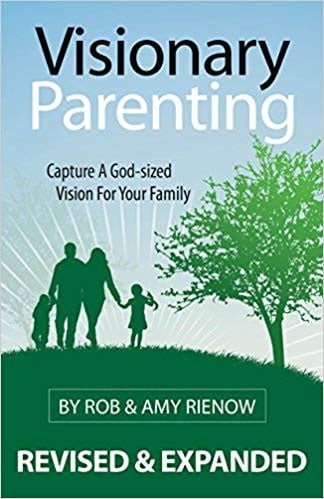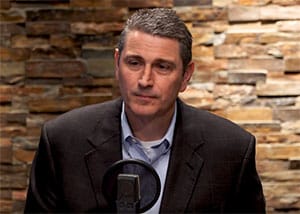Opening:
Excerpt:
Rob Rienow: We need the supernatural power of God, in our homes, in our hearts to change our hearts toward each other, toward Him, toward our kids. And that happens through prayer and time and his Word together.
End of Excerpt
John Fuller: Well, the decisions we make as parents today can have a lasting impact on our children tomorrow. And on Focus on the Family, we’re joined by Rob Rienow and his wife, Amy. And they’re going to share about creating a godly family vision to help point your children to Christ. I’m John Fuller, and your host is Focus president and author Jim Daly.
Jim Daly: John, that’s an incredible promise, isn’t it? We’re going to talk about how to create a vision for your family. That’s awesome. It’s so important for us to see our family the way God does. And if we want to raise godly children, we kind of need to know where we want to go, right? And so often, particularly even us Christian families, we kind of live day by day. Some days are like that for me. I don’t know about you, John.
John: Oh, yeah.
Jim: And, you know, you’re trying to just put food on the table and get things done and make sure we are all intact at bedtime.
John: We’re trying to keep up, but we’re failing at that.
Jim: (Laughter) That’s right. But, you know, as parents, I – I know how meaningful it is to pray and read Scripture and how, again, the tasks of the day can consume us. And we don’t get around to that. But the Rienows have learned the importance of putting God first. And they have an incredible testimony of how the Lord work through their brokenness, how the Lord work through their brokenness to, uh, start a family ministry. So that’s a lot right there. And whether you have small children or maybe grown children out of the home, this is going to be applicable to you. And maybe you’re even newlyweds and you haven’t started the family yet. I envy you because this is great content.
John: Yeah. It’s never too soon to start getting, uh…
Jim: Yeah (laughter).
John: …educated and ready for kids. And the Rienows are the founders of Visionary Family Ministries. They host family events at churches around the U.S. and have seven children ranging from young adults down to age 5, I believe.
John: That qualifies you.
(LAUGHTER)
Rob: Twenty-one to 5.
John: That’s great. What a great spread.
Jim: Hey. Welcome to Focus on the Family.
Amy Rienow: Thank you.
Rob: Thank you so much.
Body:
Jim: Let’s start right at the beginning. How’d you guys meet? What were your expectations? I mean, we – everyone listening right now who is married, uh, has expectations when they get into the relationship, right? “This is how it’s going to flow between us. We’re going to get up every day, and we’re going to pray together for at least an hour.”
(LAUGHTER)
Jim: “And then we’ll make the coffee, maybe. And then we’ll get on with our day.” And it typically doesn’t go that direction. So how did you two meet, and what were those expectations?
Amy: Yeah.
Rob: Well, we’ve been married 25 years. Now, we met – our eyes met across a crowded room August 28, 1993.
Jim: I could feel the music.
Amy: (Laughter).
Rob: I know. We, – we were both starting graduate school at Wheaton College, and we – we shared a moment of attraction with one another. Um, but, it was a few months later we went on our first date. We were engaged. We dated for five months. We were engaged for five months and got married – so 10 months from first date…
Amy: Date…
Rob: …to wedding day.
Amy: …To wedding.
Jim: (Laughter).
Rob: Now, you talked about, you know, what were expectations and things like that. I mean, I was in love with her. She was in love with me. We both loved the Lord, but I was clueless about, really, what the purpose of family was. I was clueless about what the purpose of marriage was, being a husband was. She was less clueless than me, which is a shocker. But…
Jim: (Laughter).
Rob: But nevertheless, even though I was a Christian and a pastor, I – I didn’t understand why God had put our family together.
Amy: I like to say that we got married and then dated, um…
(LAUGHTER)
Amy: …Because, you know, we – it was 10 months from first date to wedding, so there were a lot of surprises in those first couple years. I mean, we were really still getting to know each other.
Jim: Sure.
Amy: We – we didn’t realize how clueless we were about family, though, because remember; he’s a pastor. He has several degrees, highly educated. You know, I was…
Jim: (Laughter) Are you proud of him?
Amy: I was impressed, yeah, impressed with his intelligence. I was getting my masters in counseling with an emphasis on marriage and family therapy. So…
Jim: So, you had all the tools you needed.
Amy: Right. We really…
Jim: Yeah.
Amy: Yeah. At the time, we thought we were highly informed of what we were doing.
Jim: Sure. Everyone does.
(LAUGHTER)
Amy: Yeah, right. Everyone does, right? In fact, I joke about this, because we – he was a youth pastor. And we were actually doing seminars for parents on, like, how to help their teens. And I think, wow, were those some pretty desperate parents listening to us about…
(LAUGHTER).
Amy: Doesn’t that show the times? Because, we don’t even have children at the time, but we’re giving advice to parents, because we – of our education. So, we had a lot of surprises. And one thing that we came in common is that we both came from homes with Christian moms, with fathers who were not believers.
Jim: Interesting.
Amy: So, we shared that, that kind of, yeah, you were – we grew up in a Christian home, but sort of, we didn’t also, because our fathers were not the spiritual leaders of our homes.
Jim: Yeah.
Amy: So, that gave us – I think that became more prevalent of the problems we were facing, because neither of us had that as an example in our background.
Jim: Yeah. And Rob, I think, it was 2004; then you hit a crisis point you felt in your family. I don’t – how long were you married at that point?
Rob: Yeah. We would have been married 10 years.
Amy: Ten years.
Jim: So, you’re 10 years at that point.
Amy: Ten years.
Jim: 2004. What happened in that given moment that got your attention – I’m sure, both of your attentions?
Rob: Yeah. 2004, been married 10 years. We had four children. I was a youth pastor those first 10 years. You know, as a youth pastor, you know, No. 1 passion of my life is passing my faith to other people’s children, right? So, I want to – I’ll pray with other people’s kids. I’ll do retreats with other people’s kids. I’ll do lock-ins with your junior-higher.
Jim: (Laughter).
Rob: All right. It’s a horrible idea, but, uh – I…
Jim: Somebody has to do it.
Rob: Somebody has to do it.
Jim: (Laughter).
Rob: I was just all in on, you know, helping the next generation follow Christ, which is a great season of ministry for us. But the problem was, I was praying with other people’s children and not praying with mine.
Jim: Yeah.
Rob: …And reading the Bible to other people’s children, not reading the Bible with mine. I was -and Amy was really trying to help me see this- that I was this spiritual leader at church and just very, very passive in my house. And it was that summer that the Lord brought me to this place of brokenness and repentance. And as it says in Malachi 4 and Luke 1, you know, turned my heart to the ministry of my family and just convicted to me – in me that my most important ministry for God began, you know, with the souls he had entrusted to my care. And one way the Lord communicated to me was that, you know, Rob, you’re putting your spiritual opportunities, you know, in front of your spiritual responsibilities.
Jim: Yeah.
Rob: And since that, we’ve been on this journey. It hasn’t just been a one-time repentance deal.
Amy: No.
Rob: But we’ve been on this journey of, you know, what does it really mean to live for Christ in our home and to put our ministry in one another first and overflow from that?
Jim: Right. And that’s what we want to continue to uncover here, because it’ll help people. But before that, I remember a story not long ago that we received here at Focus on the Family from a youth pastor, who was out doing exactly what you described – you know, doing the rock climbing with the junior high kids and the high school kids. And, they had a 4-year-old daughter, if I remember the story correctly. And he came home on a Saturday afternoon, showered up and spent a couple hours with the family. And then he said, “I’ve got to go back to church to tell teenagers about Jesus.” And he was saying this to his little 4-year-old girl. And the 4-year-old turned to him and said, “Daddy, when are you going to be at home to tell me about Jesus?” That’s kind of the story you’re describing.
Amy: Yeah. Yeah.
Jim: Wouldn’t that be a powerful statement from your little girl?
Amy: Right. Right.
Rob: Well, it sounds familiar with…
Amy: Sounds…
Rob: …My…
Amy: Yeah.
Rob: My 21-year-old son was 3. We were walking to church one day. We’re about a block and a half away from the church building. My 3-year-old son says, “Is this where you live, Daddy?”
Jim: Wow. So, that paints the picture.
Rob: I could take you right now. I mean, I can take you to the square foot of concrete, right where I was standing, when he said that to me.
Jim: So, that was a big rock in your change.
Rob: It was. It was huge.
Amy: And – and let me add that Rob wasn’t what I would call a bad dad in any way, in the sense that he – when he was home, he wanted to be with the kids. He wanted to help. He wanted to play with them. And right before the Holy Spirit really worked in his life, I was almost kind of ready to give up on this vision of my husband being the spiritual leader of our home, because – and I’m not necessarily recommending the process that I did to get there. But I – I just sat around and kind of looked at the landscape of my friends and their husbands. And I realized, you know, I don’t – maybe what I’m looking for – my husband being the spiritual leader of the home, is just too much to ask for, as a wife, because I really didn’t see it happening around me. So, I’d kind of gotten to that point. I was like, “OK. I should just accept the status quo and be thankful for what I do have.” And it was really me getting to that point, I think, that the Lord –then the Holy Spirit took over and worked in his heart in a way that – that I could never – I can’t be the Holy Spirit for him, you know?
Jim: Sure. So you kind of accepted the status quo.
Amy: Yeah.
Jim: …and thought this would be the way it would be, probably filling some of those gaps.
Amy: Oh.
Jim: Did you…
Amy: Definitely.
Jim: …Step up…
Rob: Oh, yeah.
Jim: …And start doing things that maybe you felt Rob should be doing?
Amy: Yeah. I – I was doing those things anyway, I think, but not – even the Lord was convicting me that I was prioritizing things – the – my priorities were out of whack, too, I would say, because there’s – still, as a mom, you’re worried about the friends your kids have; you’re worried about the food that they eat; you’re worried about the activities that they’re doing. And the Lord had to convict me that, you know, reading the Bible to them has to be my primary concern, as well.
Jim: Right.
Amy: So, I got to the point of just, OK, if I’m not opening the Bible at breakfast with them, then I’m going to do it at lunch. If I don’t do it at lunch, I’m going to do it before bed. I just, you know, started to say, “OK, this has got to happen sometime today, whenever it happens.”
John: Our guests today on Focus on the Family are Rob and Amy Rienow, and they’ve written a book, Visionary Parenting: Capture A God-Sized Vision for Your Family. We’ve got copies of that and, additionally, audio of this conversation at focusonthefamily.com/broadcast.
Jim: Rob and Amy, in your book, you do get to some really practical advice, and I want to – basically, I want to hook the listener. So, if they’re connecting with this, feeling like, “Yeah. Maybe I haven’t been as engaged as I should be” – I mean, there’s days I don’t feel like that – many days. You know, I come home depleted. That’s why I’m asking those questions. It’s for a friend of mine.
(LAUGHTER)
Jim: You know, but you just feel like, “Wow. OK. Maybe I’ve missed the mark there,” or you’re really intentional with the time that you have with your children, but it’s just not enough. I love that old saying. It’s – you know, people would say, it’s about the quality of time, not the quantity. And here at Focus, we’ve said for decades, it’s both quantity and quality. People, kids need your time, and a lot of it. And so, sometimes as adults, we can blow by that. “I gave him a great two hours last week.” That’s just not enough. And we’ve got to remember that. So, let’s hit a couple of these that you mention in the book. You touched on this, Rob. Talk about daily life from a spiritual perspective. That’s a good one. Just be talking about the Lord, right?
Rob: Yeah. Well, I’ll give you a recent parenting fail in this to illustrate…
Jim: (Laughter) Oh, good. I love the failures.
Amy: (Laughter).
Rob: …From the negative…
Jim: Keep ‘em coming, buddy.
Rob: …side. Our eldest son, R.W., 21 years old, college junior, plays baseball in college and pays for college through baseball. Praise God for that, right? And, last year, he was having a rough time at the plate, over a series of games, and dad was getting a little stressed about that. And, I told him as he was going into his game, and I said, “R.W., I just want you to know I am praying for you, that the Lord is going to give you peace at the plate. He’s going to let you see the ball well, collect a few hits, get back on track.” He said, “Dad, I really appreciate you praying for my hits, but I’d rather you pray for my heart.”
Jim: Oh, wow. There’s some wisdom.
Rob: Good point, son.
(LAUGHTER)
Rob: Well-taken. You know, it’s just a great example from him saying, “Look. Whether I get hits or not,” he said, “The issue is” – you know what I mean? “Am I trusting God through this, right? Am I continuing to encourage my teammates through this – hits, no hits, whatever?” So, everything that’s going on, there’s a heart component, there’s even a faith component to what our kids are dealing with. And what we’re asking the Lord to do is to help us stay focused on their heart component…
Jim: Right.
Rob: …and the faith component.
Jim: Well – and, you know, I don’t want to be “captain obvious” here, but, I mean, what you’re talking there is performance-based parenting.
Rob: Right.
Jim: And we’re all guilty of that, because we want our kids to do well. And so, we end up leading – and I’ve had a similar discussion with one of my two boys, you know, about performance. And his response was, “Well, if I’m a Christian, Dad, isn’t that enough?” “Well, of course, but you want to be a Christian, plus a lot more.”
(LAUGHTER)
Jim: You know, it’s that contradiction that we have.
John: Isn’t it true, though, when our kids do that to us, there really is a glimmer that I did something right? I mean…
Amy: (Unintelligible) right. Exactly.
John: they’re calling me out. It stings, but, yay! You got it!
Amy: (Laughter, unintelligible).
Jim: There’s still that side of me that’s going, “Yeah. I don’t know if I’m being manipulated here.”
(LAUGHTER)
Rob: You know, the Scripture that has been convicting me lately – and, really, the Holy Spirit pressing, “Rob, do you really believe this?” Because it – Of course, I believe it. And Jesus, says “Seek first my kingdom and my righteousness, and everything else will be added to you as well.” Like, do – as a parent, do I believe that, that if my kids will seek His kingdom and seek His righteousness, the Lord promises He will take care of the rest of the stuff? And that’s a – some days I do. Some days I don’t.
Jim: Right. Amy, let me ask you as a mom – this encouragement that you expressed in the book – encourage family members to pray for each other. That sounds like Jean at the dinner table. “Hey, we need to pray for each other.” That can sometimes be overwhelming when mom particularly is seeing the sibling rivalry and all the stuff that can happen.
Amy: Yes. Yes.
Jim: So, how do you keep that went on track? “Hey. Hey. Hey, remember – pray for each other. Don’t hit each other.” (she answers below in green)
Amy: But, what’s interesting about praying together is that in the current evangelical life, I would say, it’s very easy for all of us to be isolated, meaning that women are going to their women’s prayer groups…
Jim: Correct.
Amy: …and praying with other women, and men are going to – the dads are going to their men’s groups and praying with other men. And your kids are – might be in Sunday school or youth group, and they’re encouraged to pray with other teens. And unless we in our own homes are really intentional about saying, “How are we praying for each other?,” it’s just not going to happen. They’re not going to get that message…
Jim: Yeah.
Amy: …sadly, in the church. And what I find interesting is – what’s so encouraging is that our older kids now out of the home will be often sending texts to their siblings, “How can I pray for you? How can I pray for you?” And it’s really not that complicated outside of just making that something that you’re talking about in your home.
Jim: Yeah. That’s good. That’s really good. Rob, you begin to pray for Amy, I believe. That was one of the goals you set for yourself. And how did that go, especially in the beginning?
Rob: Yeah. Well, that was actually three years after this 2004 repentance. So 2004, the Lord turns my heart to my kids, but it wasn’t till three years later, 13 years into our marriage, that God had to do another layer of work in me and convict me that I had never had any sort of vision or passion to be a spiritual blessing to my wife. And so, once God did that, yeah, the very first thing that changed was, we started praying together every night before bed. So, we’ve got 12 years now of daily prayer before bed. Now, we – again, I’m not bragging. We had 13 years of no prayer, 12 years with prayer. So, I’ve got a year, before I’m dug out to (unintelligible).
Jim: At equilibrium.
Rob: Yeah, at equilibrium.
Jim: (Laughter).
Rob: So, I’m almost there. But, yeah. That’s – that’s the very first thing that – that changed. And that piece has had such a dramatic effect on our marriage relationship. I can’t even tell you. One of the areas where I think we’ve gotten a lot better – and it’s a double-sided coin, I guess. But we’ve gotten a lot better at praying in the midst of conflict now. So, we’re going around and around on something, and one of us says, “I think we should pray.”
Jim: (Laughter) That sounds like a good attitude.
Rob: “You know,” and…
(LAUGHTER).
Rob: Oh, it’s the worst, right? It’s the last thing you want to – you know, you want to do, because you – so we walk over to each other. We hold hands like a cold, dead fish, you know. And…
Jim: You never talk about lightning strikes at this point, do you?
Rob: Oh, man, ‘cause you have to – right? You have to lower the guard of your heart.
Jim: Oh, yeah.
Rob: Right? And you have to humble yourself.
Jim: It’s powerful.
Rob: And one of us will just say, “OK. God, help us.” And three words out of our mouths – “God, help us.” So many times, the Holy Spirit rushes in, softens my heart to her, softens her heart to me. You know, we’ve been – we’ve been in an argument for 45 minutes, going around and around, and now there’s an exit ramp that make – right? – the Holy Spirit makes available. So, many years of our marriage were – were prayerless. And we were – if we’ve learned anything in our almost 25 years is that our good intentions and our willpower are going to get us nowhere.
Jim: Right.
Rob: We need the supernatural power of God, in our homes, in our hearts to – to change our hearts toward each other, toward Him, toward our kids. And that happens through – through prayer and time and his Word together.
Jim: And that – I mean, I love that picture that you painted of being together, praying together. And sometimes in – I know in my relationship, it tends to be episodic. You know, if there’s real hard pressure, difficult moments, Jean and I are praying together. And then when things are calm, we tend to, you know, hit the pillow and fall asleep.
Amy: Right.
Jim: It’s probably a pretty common pattern for many Christian couples. But, being consistent – that’s really important. I – I’m trying to recall a stat I saw that if a couple, a married couple is reading the Word regularly – not every day, but three or four times a week – and praying together three or four times a week, the divorce rate within that group is less than 1%, if I remember correctly. So, when you talk about the silver bullet, the power of prayer, the power of God in your life, I mean, that’s evidence of it right there, when the general community is 40, 50% not making it. So, that’s a statement. All of us who are parents have felt kind of overwhelmed at times. I think I was describing that a minute ago. In fact, Amy, you were having trouble, I think, home-schooling Lissy, your daughter.
Amy: Yeah.
Jim: What was going on, and why was that a spiritual pressure?
Amy: Well, she – my firstborn was a very compliant firstborn child. So then, you think homeschooling’s going really, really well. And then you have another personality…
John: And then you have a second child, you know?
Amy: Right. You have a second child that…
Jim: And you’re asking yourself, “Did I make a mistake?”
Amy: Well, very…
Jim: In terms of schooling.
Amy: Very, yes – in schooling. “Can I really do this, you know?” Very strong-willed – I mean, to the point is – to the point I can remember her saying to me – one time calling me to her room to show me, “Mom, which of these dresses do you like?” And, you know, I showed her the one I liked. And then she, of course, “OK, I’m going to choose this one.”
(LAUGHTER)
Amy: I mean, it was really that…
John: Yes (laughter).
Amy: …That specific and that intentional. Um, but my friend – I called my friend, who was kind of my mentor. And I was like, “I can’t do this with Lissy. I mean, it’s working great with R.W., but it’s not working with Lissy.” And she said, you know – she said – gave me such great wisdom. She goes, “You know, Amy, the Bible says to honor your father and your mother. And I know you kind of want to solve this problem by sending her to a teacher, because she’ll honor a teacher better than she’s honoring you right now, but the Bible doesn’t say honor your teacher. It says honor your father and mother.” She says, “You have a heart issue that you have to be dealing with. And it’s really not going to go away by” – I was kind of thinking, I can delegate the heart problem to someone else, but really, it was working on our relationship. It was teaching me as a mom, I needed to learn a different type of grace and understanding for my daughter, not trying to parent her the same way that I was parenting my first. She needed me to see her, not to see her – I like to say with a product mentality, with trying to just – what I was trying to produce out of her, but to see her for who she was. And she needed to work on honoring her mother, because she was the type of kid who would just perform – like, she was in pre-school and, you know, the teacher actually asked me, “Does your daughter walk on water?” That really happened to me (laughter). The teacher – they – she was an angel in the classroom. I mean, she could do no wrong. Her issue was learning how to give that kind of honor to her family. She needed to learn that.
Jim: And did she?
Amy: She did. She did. It took – it was not an overnight process.
Jim: Right.
Amy: This was a period of probably four or five years of really understanding, you know, she – just, there were lots of issues.
Jim: Yeah, when you look at that, though – again, many parents are listening, and they have that child, maybe that strong-willed child at some point in that phase of development or construction, if we say it that way.
Amy: Right.
Jim: So, I’m painting that picture, wanting to paint that picture of hope for them that it is a lengthy process.
Amy: It is.
Jim: They will have awakenings along the way. They’re going to see glimpses of, oh, he or she could be better in this area. Describe, if you could look at one or two core things that you felt made the difference for your daughter, what were they?
Amy: I would say, the power of acceptance is very, very important.
Jim: Feeling accepted.
Amy: Yeah. A child has to feel accepted by their parents for who they are. And I think that – well, let me share a little story. One night when I was putting Lissy to bed, I said – I always ask my kids, “Do you know I love you?” And she said, “Yes.” But the Lord kind of inspired me to ask another – Holy Spirit put a question – I said, “Do you know I’m proud of you?” And she said, “No.” She wasn’t living under my pleasure, I like to say.
Jim: Right.
Amy: …Because, she felt that she was constantly falling short of expectations, and we were just at odds on so many things. So that was so eye-opening to me as a mom, because she needed to feel successful at home. I think that if our kids don’t feel success at home and encouragement, and they don’t feel their parents’ pleasure – and she definitely would say, but kids who could get all of that outside of the home. I could see the long-term path that we would be on, where she would desire to be outside of the home more than she would want to be inside the home, if I didn’t start changing the atmosphere for her.
Jim: And let me – again, because I think this is extremely helpful. That’s why I’m pressing you on this a bit. But, what were those things that you did to change the atmosphere of the home?
Amy: Well, again, I’ll specifically think of her relationship – is – is letting go of some of my standards, understanding that I couldn’t just be – I was sort of – had this idea that I needed to produce these super-Christian kids.
Jim: Sure. You’re speaking for so many moms right now. That’s why this is so good.
Amy: Yeah. And so, I had a product mentality, as opposed to the fact that I was raising a person…
Jim: Right.
Amy: …That I want to have a lifelong relationship with. And so therefore, I had to change the way I viewed the whole situation, starting to understand – really getting to her heart. And so, the phrase that we would use when we would have a conflict – we would end a conflict with me asking her, “Will you give me your heart?” It meant, “Will you open yourself up to me? Will you keep sharing your feelings with me? Will you keep letting me in?” – and just reiterating to her that I was committed to her, that I loved her more than anybody – her dad and I loved her more than anybody else on this planet and that we wanted the best for her. So that – I like to say to my kids, especially when they’re entering those teen years, you know, “You may not like me right now, and I may not like you right now, but we are committed. I mean, I am committed to you.” And I’ll even use the phrase, “I would take a bullet for you.” There are not that many people on this planet who would die, but as parents, we’ll die for our kids, right?
Jim: Right.
Amy: So, they need to hear that. They need that – it needs to be verbalized to them. And just tell them, it’s going to look messy, and we’re not always going to like each other, and – but we’re committed. That’s the point.
Rob: In the Visionary Parenting book, one of the longer sections is we talk about parenting both the “what” and the “why” of your kid’s behavior and – and issues. The “what” is, what are they doing? All right. And maybe they’re making bad choices and things. Well, talk about the “what.” Give consequences for the “what.” But the bigger issue’s the “why.” What’s the heart underneath…
Jim: Correct.
Rob: …The choices that they’re making? And the long-term help, the long-term blessing to our children, is connecting with their hearts and pointing their hearts toward Christ.
Jim: Yeah. You know, as we wrap up, I’m mindful of the parent that maybe has a 20-something. So much of the data suggests that Christian young people coming out of Christian homes, a majority of them will walk away from the faith for a while. I know there’s some other great research being done about how many come back, and many do. And I want to make sure we paint that picture. But for that parent who’s living in that – that space right now, that their child may be 24, 25, they’re challenging everything spiritually, they’re not absorbing the faith, embracing the faith, and in some ways, maybe, they’re prodigals – speak to the mom and dad in that spot who are probably racking themselves, thinking, “What did we do wrong? How could we have done better?” Speak to the heart, that wounded heart of the parent with a prodigal.
Rob: Yeah. Well, the first thing, by way of encouragement, is – and a big part of our ministry is working with those parents of prodigals – is you have to grab hold of the truth that it’s never too late. And when we say it’s never too late, what we mean – it’s never too late for God to use you as mom, use you as dad, as grandma and grandpa to make a difference for that 20-something, that 30-something something. See; the way the enemy works is, one of his big deception in this area is, “Hey, you missed your window.”
Jim: “It’s too late.”
Rob: “You missed your chance. You know, you don’t have any influence anymore. All you can do is pray for them now. And, you know, we all know prayer doesn’t do any good.” I mean, that’s not true. That’s the enemy, right? That’s the deception…
Jim: Right
Rob: …here. So, what ends up happening is a parent, withdraws their pursuit. And, again, they’re – they’re laden with the guilt or whatever it might be, but they withdraw their pursuit, thinking their window of influence has closed. So, our encouragement to you is no, no. This mission of parenting – ask any parent of an adult child; they will tell you, the mission of parenting does not end when your kid’s 18 – right? – actually gets a little harder and more complicated, perhaps. But this is a lifelong mission. And, some of those new studies you’re talking about kids coming back to the faith in their 20s and 30s – No. 1 factor for those who do come back – long-term influence of mom and dad.
Jim: Boy, that’s good, right there.
Rob: So, it’s never too late, never too late.
Amy: Right.
Jim: So, stay the course. Remember, it’s a person, not a product.
Amy: Right.
Closing:
Jim: I love that. That’s a real – that’s a great takeaway. Rob and Amy, thank you for your life’s work and sticking to it. And praise God that he got a hold of both of your hearts. And Rob, you know, ten years into your marriage, He kind of gave you the wake-up call as a youth pastor to start pastoring your own family. I mean, that’s convicting for every one of us. So, Visionary Parenting – I don’t know why you wouldn’t want a copy of this book. What family would not want to understand, “What does God want from our family? How do we create a multigenerational influence on our family?” It’s fantastic, and I hope that you can support the work of Focus. And we will send you a copy of this wonderful resource as our way of saying thank you for that support.
John: Yeah. You can get the book and the audio of this conversation at focusonthefamily.com/broadcast. And, we also have our free parenting assessment. That is just a little five-, six-minute quiz.
Jim: It’s really good.
John: It’s very, very helpful to help you get a handle on seven key areas of your parenting. You can also call us by phone if you’d prefer. Our number is 800, the letter A and the word FAMILY – 800-232-6459.
On behalf of Jim Daly and the entire team, thanks for joining us today for Focus on the Family. I’m John Fuller, inviting you back as we once again help you and your family thrive in Christ.























